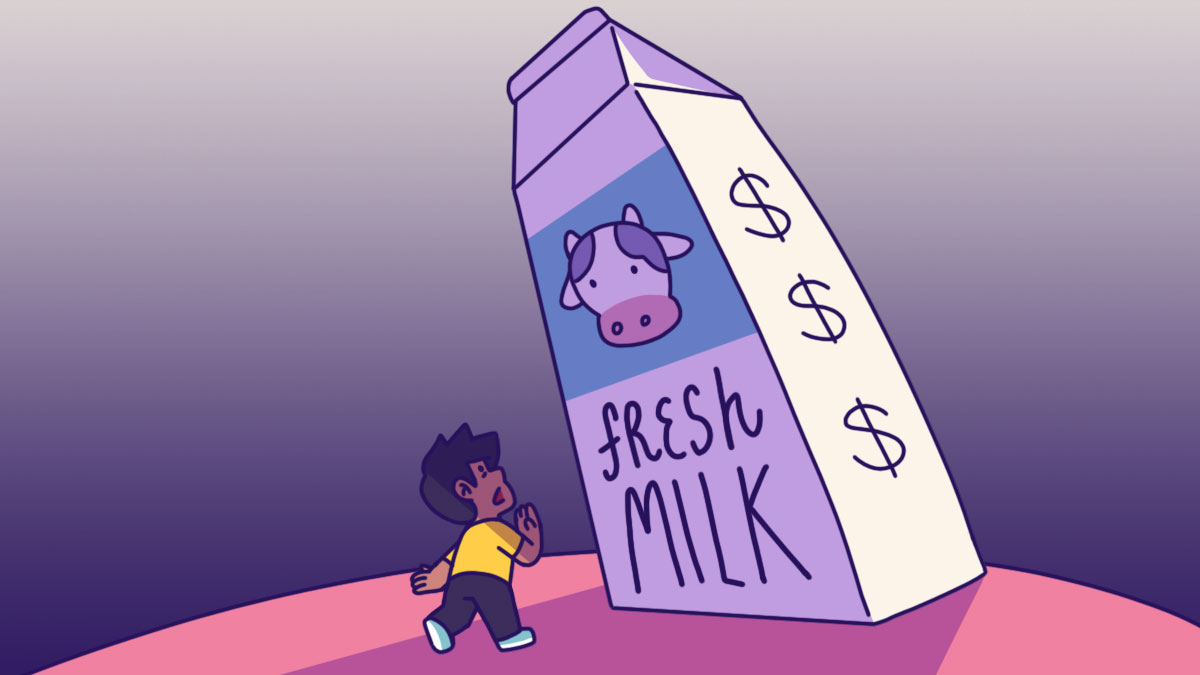Budgeting | Financial Planning | Personal Finance | Article
Help, Things Are so Expensive Now: Ways to Cope with the Rising Cost of Living
by Ooi May Sim | 19 May 2022

Since the start of 2022, you may have noticed a sharp rise in the price of your fruits, vegetables, toilet paper, and other daily essentials. And this isn’t just happening to your groceries; the cost of transportation, education, and health care are increasing steeply as well.
For many of us, these price hikes have caused our overall cost of living to dramatically go up. Suddenly, expenses that used to be well within our budgets isn’t anymore.
So what gives?
Global supply shortages has caused prices to go up
Right now, the world is facing supply shortages for many goods and raw materials due to the Covid-19 pandemic and geopolitical tensions. As the law of supply and demand goes, when supply is low and demand hasn’t dropped, prices tend to go up.
To exacerbate matters, rising oil prices and higher wages due to labour shortages in almost all industries makes it even more expensive to produce and transport goods. The recent increase in minimum wage is also expected to further push prices up in the coming months.
This means that the prices of goods and services are going to go up faster than most of our salaries (if they haven’t already). While there’s little we can do to control this inflation, there are, however, actions you can take to cope with the rising cost of living, especially if you are already feeling the pinch.
Create a (new) budget
The great thing about putting a budget together is that you’ll know exactly how every cent is spent because you’re keeping track of your expenses.
And knowing how much you spend in each category (food, bills, housing, transportation, insurance, etc.) makes it easier to cut back on unnecessary expenses to accommodate for the rising cost of living.
If you already have a budget, review it again to see which expense categories have increased because of inflation. For instance, you may notice that your transportation costs have gone up because of the increase in petrol prices or that eating at restaurants is becoming increasingly expensive.
Once you have an idea on how inflated prices are impacting your monthly expenses, you can adjust your lifestyle and budget to ensure that you’re still spending within your means while being able to meet your monthly financial commitments.
This could mean taking public transport two to three days a week so you’ll spend less on petrol, or by making more home-cooked meals instead of eating at restaurants.
Cutting down on expenses will be challenging as it takes a lot of discipline and sacrifice but you can start with small steps to ensure you don’t feel overwhelmed.
If you don’t have a budget at the moment, it is time to create one. Budgeting may sound like a big task, but it really isn’t. There are various budgeting methods that cater to different people and lifestyles such as the 50-30-20 Rule, Kakeibo, Zero-Based Budgeting, and Envelope Method — pick the method that suits you.
Make some lifestyle changes
As the price of goods keep getting higher, it’s only a matter of time before you would need to make some lifestyle changes. It may be difficult (especially at the beginning, as you would be used to living with ‘more’), but as we only have a fixed amount of money every month, the way in which we spend and allocate it becomes increasingly important during times of inflation.
A change you can make is by ditching branded items. For instance, a drugstore brand shampoo costs less than a professional shampoo brand.
Instead of paying someone else for tasks like cleaning the house or tending to your garden, you may want to consider doing these tasks yourself for the time being.
You can also reduce your electricity and water usage by using your air-conditioning sparingly, and by planning your laundry load so it is full every time you wash a round of clothes.
If you are renting, you can move to somewhere cheaper, or to a smaller unit to save on rental.
Related
Consider restructuring your debt
Your home loan and car loan repayments likely make up the bulk of your monthly expenses. If you’re having trouble managing the debt repayments because you need to fork out more money for day-to-day expenses, you can consider restructuring your loans to reduce your monthly commitments.
Speak to loan providers to get more favourable interest rates and monthly payment schemes. Make sure to check if there’s any extra charges or fees too. If there is a better offer on the table, consider switching your loan.
Find ways to supplement or increase your income
While cutting back on expenses and making lifestyle changes can help you manage the rising cost of living, there will come a point when spending less will likely lead to a lower quality of life.
A more effective approach to fighting the impact of inflation on your ability to spend is to have additional money to spend. You can achieve this by finding ways to supplement or increase your income.
Well, the best (and fastest) way to boost your income is to ask your boss for a raise (Here are some tips on how you can do it). If that isn’t successful, consider taking up a side gig.
Earning additional income is much easier these days with many e-commerce platforms at our disposal. But you’ll need to manage your time properly to ensure you are not overworked or burnt out, especially if you already have a full-time job.
You can either monetise skills you have or find ways to fill gaps or demands in the market. For instance, if you have a driving licence, you can do part-time deliveries during your spare time. Or, if there are a lot of working pet owners in your neighbourhood, you can offer to walk their pets for them. For a small fee, of course!
Related
Invest so your wealth outpaces inflation
Although the steps above showed more immediate steps to addressing the rising cost of living, the biggest issue that inflation creates is that it devalues our money in the long run.
To illustrate this point, imagine setting aside RM100,000 in savings. This same amount of money will only be worth RM55,367.58 in 20 years, after calculating the average inflation rate of 3% annually. This means that you will be able to buy and afford less things in the future with the same amount of money.
The only way to overcome this is to place money you don’t need immediately (such as retirement savings) in an investment that can outpace inflation (offers over 3% returns).
But before you jump into any new investments, do your research and read up about the different options available and what each of them has to offer. Make sure you have an emergency fund so you don’t have to withdraw these investments prematurely, which often imposes penalties if you do.
Financial experts also recommend investing in a diversified portfolio of asset classes to reduce risk and make you better equipped at weathering economic shock such as high inflation.





















